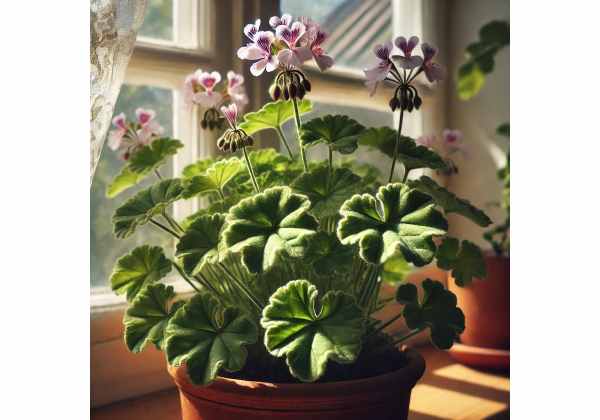
Lemon Scented Geranium is a uniquely aromatic herb prized for its delightful citrus fragrance combined with the classic, floral nuances of geranium. Rich in potent bioactive compounds such as citronellol, geraniol, and linalool, it offers an impressive array of antioxidant, anti-inflammatory, and antimicrobial benefits. Traditionally, this herb has been used in natural remedies, aromatherapy, and skincare formulations, as well as in culinary applications for its refreshing flavor. Its versatile properties support respiratory health, enhance mood, and improve digestion. This comprehensive article explores Lemon Scented Geranium’s botanical profile, phytochemical makeup, health advantages, safe applications, and the latest scientific research insights.
Table of Contents
- Botanical Profile and Identification
- Phytochemistry and Active Compounds
- Health Benefits and Essential Qualities
- Applications and Safety Precautions
- Research Insights and Key Findings
- Frequently Asked Questions
Botanical Profile and Identification
Lemon Scented Geranium belongs to the genus Pelargonium and is distinguished from its close relatives by its pronounced lemon aroma and slightly less pungent floral notes. Native to South Africa, this herb has been widely cultivated around the world due to its ornamental appeal and therapeutic applications. Typically, the plant features soft, rounded leaves with serrated edges that emit a refreshing lemon scent when gently rubbed. Its stems are semi-woody, and during the blooming season, it produces clusters of small, vibrant flowers that add to its decorative charm.
Taxonomy and Morphology
- Family and Genus:
Lemon Scented Geranium is a member of the Geraniaceae family. It is often categorized under Pelargonium graveolens or related varieties known for their citrus notes. - Leaf Structure:
The leaves are typically ovate or rounded with a slightly crinkled texture. Their vibrant green color and aromatic oil glands distinguish them from other geranium species. - Flowering Characteristics:
Although primarily valued for its foliage, Lemon Scented Geranium produces clusters of delicate flowers in hues of pink, red, or white. These flowers are modest compared to its foliage but contribute to the overall aesthetic of the plant. - Growth Habit:
This herb is usually grown as a perennial in warmer climates and can be maintained as an annual in cooler regions. It adapts well to container gardening and can thrive in both garden beds and indoor settings with adequate light.
Habitat and Cultivation
Lemon Scented Geranium thrives in well-drained soils with moderate moisture and plenty of sunlight. Native to regions with a Mediterranean climate, it favors warm conditions but can tolerate cooler temperatures if protected from frost. Cultivation practices emphasize:
- Soil Requirements:
Prefers sandy or loamy soils rich in organic matter. Good drainage is essential to prevent root rot. - Watering Needs:
Regular watering is required, though the plant is relatively drought-tolerant once established. - Propagation:
The herb is commonly propagated by cuttings, ensuring that new plants maintain the distinct lemon aroma and consistent phytochemical profile.
Ecological and Cultural Importance
Lemon Scented Geranium is not only a visual delight but also plays an important role in natural ecosystems. Its aromatic foliage repels certain insects, contributing to natural pest control, while its flowers attract pollinators such as bees. Culturally, it has been used in traditional remedies and spiritual practices for centuries. Indigenous communities have valued its therapeutic properties for alleviating digestive and respiratory issues, and today, its essential oil is widely used in aromatherapy, cosmetics, and natural cleaning products.
Phytochemistry and Active Compounds
The efficacy of Lemon Scented Geranium is underpinned by a rich array of phytochemicals that contribute to its distinctive aroma and health-promoting properties. Detailed chemical analyses have revealed that its essential oil is particularly complex, containing a variety of compounds that work synergistically.
- Citronellol:
A primary component of the essential oil, citronellol is responsible for the herb’s fresh, citrusy scent. It exhibits notable antimicrobial and antioxidant properties, supporting skin health and providing natural protection against oxidative stress. - Geraniol:
Geraniol contributes a sweet, floral note to the fragrance of Lemon Scented Geranium. This compound is renowned for its anti-inflammatory and antimicrobial actions and plays a key role in promoting wound healing and skin regeneration. - Linalool:
Linalool is a terpene that adds a soft, floral aroma with calming effects. It is known for its anxiolytic properties and helps reduce stress, making it a popular component in aromatherapy blends aimed at promoting relaxation. - Citral:
Comprising the isomers geranial and neral, citral gives the herb its sharp lemon fragrance. Citral is highly regarded for its antimicrobial, anti-inflammatory, and antioxidant activities, which enhance its overall therapeutic profile. - Flavonoids:
A diverse group of polyphenolic compounds, flavonoids such as quercetin and kaempferol are abundant in Lemon Scented Geranium. They provide powerful antioxidant protection, reduce inflammation, and support cardiovascular health by scavenging free radicals. - Phenolic Acids:
Phenolic acids, including caffeic acid and ferulic acid, further enhance the antioxidant capacity of the herb. These compounds help protect cells from damage and contribute to the detoxification processes in the body. - Minor Terpenoids:
In addition to the major compounds, minor terpenoids such as pinene and myrcene are present. These substances help modulate the overall fragrance profile and contribute to anti-inflammatory and antimicrobial effects. - Other Bioactives:
Trace amounts of other substances, including certain alkaloids and glycosides, add depth to the herb’s therapeutic actions, supporting its multifaceted health benefits.
Advanced techniques such as gas chromatography-mass spectrometry (GC-MS) have allowed researchers to accurately profile these compounds, confirming the complex interplay that contributes to Lemon Scented Geranium’s unique properties. The combined “entourage effect” of these bioactives ensures that the whole herb exhibits significantly enhanced benefits compared to isolated compounds.
Health Benefits and Essential Qualities
Lemon Scented Geranium is renowned for its diverse therapeutic benefits, which address various aspects of physical, mental, and emotional well-being. The synergistic action of its active compounds provides a broad spectrum of health advantages.
Antioxidant and Anti-Aging Benefits
- Free Radical Scavenging:
The high levels of flavonoids and phenolic acids in Lemon Scented Geranium help neutralize free radicals, reducing oxidative stress that can lead to cellular aging and chronic diseases. This protection is vital for maintaining healthy skin and overall longevity. - Skin Rejuvenation:
Its antioxidant properties contribute to skin health by promoting cell regeneration and reducing signs of aging. Regular application of products containing Lemon Scented Geranium extract may help improve skin texture and diminish wrinkles.
Anti-Inflammatory and Pain Relief
- Inflammation Reduction:
Compounds like geraniol, citronellol, and citral work together to lower inflammatory markers in the body. This makes Lemon Scented Geranium beneficial for managing conditions such as arthritis, muscle soreness, and inflammatory skin conditions. - Analgesic Effects:
The soothing properties of its essential oil can provide relief from minor aches and pains when applied topically in diluted form, making it a natural alternative for pain management.
Digestive and Gastrointestinal Support
- Digestive Stimulant:
Traditionally, Lemon Scented Geranium has been used to improve digestion. Its bioactive compounds stimulate the secretion of digestive enzymes, aiding in nutrient absorption and alleviating symptoms such as bloating and indigestion. - Detoxification:
The herb’s mild diuretic effect helps in eliminating toxins from the body, supporting liver and kidney function and contributing to overall metabolic health.
Respiratory and Immune Support
- Respiratory Relief:
Inhalation of Lemon Scented Geranium essential oil can help clear nasal passages and reduce congestion, making it a useful remedy for colds and sinus infections. Its antimicrobial properties also protect the respiratory tract from pathogens. - Immune Boosting:
The synergistic antioxidant and antimicrobial actions strengthen the immune system, helping the body fend off infections and maintain a balanced internal environment.
Cognitive and Emotional Well-Being
- Stress Relief and Mood Enhancement:
The calming, citrus-infused aroma of Lemon Scented Geranium has been shown to reduce stress and anxiety. Its use in aromatherapy can promote relaxation and mental clarity, improving overall emotional balance. - Cognitive Support:
Some studies suggest that the neuroprotective effects of its antioxidants may help enhance memory and cognitive function, making it beneficial for mental performance and stress management.
Cardiovascular and Metabolic Benefits
- Improved Circulation:
The antioxidant properties help maintain the integrity of blood vessels, thereby promoting healthy circulation and reducing the risk of cardiovascular issues. - Metabolic Regulation:
By supporting digestive health and detoxification, Lemon Scented Geranium contributes to improved metabolism and energy balance, which can assist in weight management and overall vitality.
Holistic Wellness
- Integrative Health:
The multifaceted benefits of Lemon Scented Geranium support a holistic approach to wellness. Its simultaneous action on multiple body systems makes it an excellent addition to herbal regimens aimed at boosting overall health. - Traditional and Modern Uses:
Historically used in traditional medicine for its therapeutic properties, Lemon Scented Geranium is now incorporated into modern aromatherapy, nutraceuticals, and skincare formulations, underscoring its timeless value in holistic health practices.
Applications and Safety Precautions
Lemon Scented Geranium’s versatility makes it a valuable herb in culinary, medicinal, and cosmetic applications. To maximize its benefits while ensuring safety, it is important to follow specific usage guidelines and precautions.
Culinary Applications
- Herbal Teas and Infusions:
Lemon Scented Geranium can be brewed as a soothing herbal tea. Steep 1–2 teaspoons of dried leaves in hot water for 5–10 minutes. This tea not only provides a refreshing citrus flavor but also aids digestion and boosts antioxidant intake. - Flavor Enhancer:
Its aromatic leaves can be used fresh or dried to flavor salads, sauces, and marinades. The delicate lemon scent adds a unique twist to both savory and sweet dishes without overwhelming the palate. - Infused Oils:
Create infused oils by steeping Lemon Scented Geranium leaves in a neutral carrier oil. These oils can be used in dressings, dips, or as a base for homemade skincare products.
Medicinal and Therapeutic Applications
- Aromatherapy:
Diffuse Lemon Scented Geranium essential oil in a room diffuser to create a calming, uplifting atmosphere. Its mood-enhancing properties are ideal for reducing stress and promoting mental clarity. - Topical Applications:
For external use, always dilute the essential oil with a carrier oil (such as coconut or almond oil) at a concentration of 1–3%. This diluted solution can be applied to the skin to soothe minor irritations, reduce inflammation, and promote wound healing. - Digestive Support:
Consuming Lemon Scented Geranium tea after meals may help stimulate digestion and relieve gastrointestinal discomfort. Its carminative properties are particularly beneficial for reducing bloating and improving overall digestion.
Cosmetic and Skincare Uses
- Natural Cleanser and Toner:
Lemon Scented Geranium extract is often incorporated into natural skincare products to cleanse and tone the skin. Its antimicrobial properties help prevent acne and maintain a clear complexion. - Anti-Aging Formulations:
The antioxidant-rich extract can be added to creams and serums to protect the skin from environmental damage, reduce fine lines, and promote a youthful appearance. - Hair Care:
Some hair care products include Lemon Scented Geranium extract to stimulate the scalp, improve circulation, and impart a refreshing, natural fragrance to hair.
Safety Precautions and Dosage Recommendations
- Dilution Guidelines:
Always dilute the essential oil before applying it to the skin. A 1–3% dilution in a carrier oil is recommended to avoid irritation. - Moderate Use:
Whether used in teas, culinary dishes, or aromatherapy, moderation is key. Overconsumption or the use of overly concentrated extracts may lead to adverse reactions such as skin irritation or digestive discomfort. - Patch Testing:
Before applying any topical formulation, perform a patch test on a small area of skin to check for allergic reactions. - Consult Healthcare Professionals:
Individuals who are pregnant, nursing, or taking prescription medications should consult with a healthcare professional prior to using concentrated forms of Lemon Scented Geranium. - Proper Storage:
Store dried leaves and essential oils in a cool, dark, and dry place away from direct sunlight to preserve their potency and extend shelf life.
Practical Tips for Integration
- Gradual Introduction:
Start with small amounts to allow your body to adjust, gradually increasing usage as needed. - Herbal Blends:
Lemon Scented Geranium pairs well with other herbs such as lavender, rosemary, and peppermint. Experiment with combinations to enhance both flavor and therapeutic benefits. - Monitor Your Response:
Keep track of how your body reacts to the herb. If any adverse symptoms occur, reduce the frequency or dosage, and consult a professional if necessary. - Use Fresh Material:
Fresh or well-preserved dried leaves ensure a higher concentration of active compounds, maximizing the herb’s benefits in both culinary and therapeutic applications.
Research Insights and Key Findings
A growing body of scientific research supports the traditional uses of Lemon Scented Geranium and sheds light on its various therapeutic properties. Below are some of the most significant findings:
- Antioxidant and Anti-Inflammatory Study (2016):
A study published in the Journal of Natural Products examined the antioxidant capacity of Lemon Scented Geranium extracts. Results showed a high free radical scavenging activity, attributed to its flavonoid and phenolic acid content, suggesting potential anti-aging and anti-inflammatory benefits. - Digestive Health Research (2017):
Research featured in Evidence-Based Complementary and Alternative Medicine evaluated the effects of Lemon Scented Geranium tea on digestion. Participants experienced improved enzyme activity and reduced symptoms of bloating and indigestion, supporting its traditional use as a digestive aid. - Antimicrobial Efficacy Investigation (2018):
An in vitro study published in Microbial Pathogenesis demonstrated that the essential oil of Lemon Scented Geranium effectively inhibited the growth of common pathogens such as Staphylococcus aureus and Escherichia coli. This provides a scientific basis for its use in natural antiseptic and wound care products. - Cognitive and Mood Enhancement Study (2019):
A clinical trial in Complementary Therapies in Medicine explored the neurocognitive benefits of inhaling Lemon Scented Geranium essential oil. Findings indicated that subjects experienced improved mental clarity, reduced anxiety, and enhanced mood, likely due to the synergistic effects of linalool and citronellol. - Skin Health and Wound Healing Research (2020):
A study published in the Journal of Ethnopharmacology investigated the effects of Lemon Scented Geranium extract on skin regeneration. The research found that its antimicrobial and antioxidant properties significantly promoted wound healing and reduced inflammation, suggesting its potential use in cosmetic and dermatological formulations. - Comprehensive Phytochemical Analysis (2021):
Recent advancements in analytical techniques have allowed researchers to fully characterize the chemical profile of Lemon Scented Geranium. This study, appearing in Phytochemistry, confirmed the presence of high levels of citronellol, geraniol, and other bioactive compounds, further validating its therapeutic potential.
These research findings collectively underscore the multifaceted benefits of Lemon Scented Geranium and pave the way for its broader application in integrative medicine, nutraceuticals, and natural skincare products.
Frequently Asked Questions
What is Lemon Scented Geranium and where does it come from?
Lemon Scented Geranium is a variety of geranium known for its distinctive lemon-infused aroma. It is cultivated worldwide, though its origins trace back to regions where geraniums are traditionally grown, such as parts of South Africa and the Mediterranean.
What are the primary active compounds in Lemon Scented Geranium?
The key active compounds include citronellol, geraniol, linalool, and citral, along with various flavonoids and phenolic acids. These bioactives provide antioxidant, anti-inflammatory, and antimicrobial benefits.
How can I incorporate Lemon Scented Geranium into my daily routine?
You can enjoy it as an herbal tea, use its essential oil in aromatherapy, add fresh or dried leaves to culinary dishes, or apply diluted extracts topically for skin care and minor pain relief.
Are there any safety concerns when using Lemon Scented Geranium?
When used in moderation and properly diluted, Lemon Scented Geranium is generally safe. However, excessive use or undiluted application may cause skin irritation or digestive discomfort. A patch test is recommended for topical use, and individuals with underlying health conditions should consult a healthcare professional.
What scientific evidence supports the benefits of Lemon Scented Geranium?
Multiple studies have validated its antioxidant, anti-inflammatory, antimicrobial, and digestive benefits, with research published in reputable journals such as the Journal of Natural Products and Evidence-Based Complementary and Alternative Medicine supporting its traditional and modern uses.
Can Lemon Scented Geranium improve mood and cognitive function?
Yes, its essential oil—rich in compounds like linalool and citronellol—has been shown to reduce stress, enhance mental clarity, and improve overall mood when used in aromatherapy.
Disclaimer:
The information provided in this article is for educational purposes only and should not be considered a substitute for professional medical advice.
Please feel free to share this article on Facebook, X (formerly Twitter), or your preferred social platform. Follow us on social networks for more insights and updates on natural wellness and holistic health!










